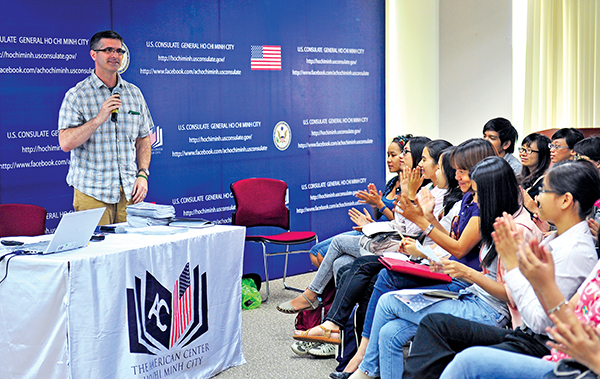An American animal activist has urged Vietnamese people to go vegetarian at least one day a week for all the health and environmental benefits that it brings, and as a way to save more animals from being slaughtered.
>> An audio version of the story is available here
Robert Lucius, Program Manager - Asia Pacific at Humane Society International, a major international animal protection organization, has recently returned to Vietnam.
Founded over 60 years ago, the Humane Society International works to protect all animals, including animals in laboratories, farm animals, companion animals, and wildlife around the world, according to its website.
Lucius served in the U.S. Marines for 22 years. After he was discharged from the army, he began working for the Humane Society International in pursuit of his animal protection cause.
In recent years, he has been engaged in activities to go against the practice of consuming dog meat.
During one of his previous trips to Vietnam, Lucius had a moment of reckoning which helped turn him from an average meat eater to a year-round vegetarian and enthusiastic animal activist.
He shared that reckoning moment with Tuoi Tre (Youth) newspaper during his most recent trip to the country.
When he was traveling on a street in Vietnam, he saw a dog which was on the way to a slaughterhouse.
The dog gave him a haunting look as if it were begging him to come to its rescue.
“I thought I was considering rescuing it when the bike carrying it went off. By the end of the trip, while I was eating, I happened to see the carcass of a slaughtered dog. I thought: ‘That’s enough. I’m done with meat,” Lucius recounted.
He then told his wife that he would go vegetarian, and sometime later his wife and their five-year-old son followed suit.
Going vegetarian brings immense benefits
“We strongly encourage people to go vegetarian. However, such a thing is next to impossible in urban life, as we tend to succumb to pressure from our families and friends and the irresistible temptation to consume meat. If you cannot give up on meat, we urge that you have meat-free meals at least one day a week. By doing so, you would save many animals from being butchered, and make incredible changes to your own health and the environment,” Lucius advised.
He explained that demand for meat, which is growing each day, has put a mounting strain on many countries.
In Brazil, people have felled some hundreds of hectares of the Amazonian rain forest each day to make room for corn and soybean crops, which are exported to such countries as China as cattle feed, he pointed out.
“However, there are many cattle parts which will go to waste such as bones, hairs, and skin. That means humans’ staple cereals are transformed into cattle meat – a considerably more wasteful form of food. The more middle-class people consume meat, the hungrier the poor are,” he elaborated.

A Tuoi Tre photo illustration of a wholesome vegetarian meal, which is made up of fried tofu, lettuce soup, and stir-fried veggies.
Lucius revealed he read an article in 2011 regarding a large pig ranch, located in the central Vietnamese province of Nghe An.
The farm, which raised up to 5,000 pigs at one time, met with vehement objections from residents for its detrimental environmental effects and foul odor emitted from a huge amount of animal waste.
The waste matters seep into underground currents before pouring into rivers and lakes, which results in a rise in nitrate and phosphate and deprives their water of oxygen, thus causing “dead zones” in rivers or lakes, Lucius further explained.
Cattle farms are second only to automobiles in causing greenhouse effects, the activist stressed.
“We vegetarians consume mostly vegetables and cereals. Their production process is more cost-effective and economical in terms of electricity and natural resources and of course emits remarkably less greenhouse-effect substances compared to meat production,” Lucius noted.
He also refuted the so-called long-standing theory that maintains humans stay on top of the food chain.
“Modern-time researchers observe that we humans are part of a ‘food grid.’ We’re reliant on other species just as much as they are on us, and therefore should make sure we won’t destroy the grid,” Lucius maintained.
He also pointed to the rising meat consumption among today’s Vietnamese people, particularly city dwellers, which goes against the people’s tradition of eating a bountiful amount of vegetables and a little meat.
Due respect for animals
The animal activist underlined that though people raise cattle or dogs and cats for food, they are in no position to maltreat the defenseless animals.
Instead farmers and slaughterers are supposed to raise the animals with the respect they deserve and cause them as little pain as possible when it comes to butchering them.
“To what I and many others know, dogs share a special bond with humans, as they are the first species we tamed around 14,000 years ago. Canines are also known for their intelligence, faithfulness, and capacity to feel and express affection toward their owners,” Lucius said.
“It’ll be a betrayal of that long-standing relationship if we kill them for food.”
Like us on Facebook or follow us on Twitter to get the latest news about Vietnam!




















































